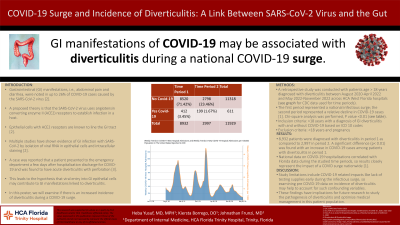Monday Poster Session
Category: Colon
P1607 - COVID-19 Surge and Incidence of Diverticulitis: A Link Between SARS-CoV-2 Virus and the Gut
Monday, October 23, 2023
10:30 AM - 4:15 PM PT
Location: Exhibit Hall

Has Audio

Heba Yusuf, MD, MPH
HCA Florida Trinity Hospital/USF Morsani College of Medicine
Presenting Author(s)
Heba Yusuf, MD, MPH1, Kiersta Borrego, DO2, Johnathan Frunzi, MD2
1HCA Florida Trinity Hospital/USF Morsani College of Medicine, Lexington, KY; 2HCA Florida Trinity Hospital/USF Morsani College of Medicine, Trinity, FL
Introduction: Gastrointestinal (GI) manifestations, i.e., abdominal pain and diarrhea, were noted in up to 26% of COVID-19 cases caused by the SARS-CoV-2 virus [2]. A proposed theory is that the SARS-CoV-2 virus uses angiotensin converting enzyme II (ACE2) receptors to establish infection in a host. Epithelial cells with ACE2 receptors are known to line the GI tract [2]. Multiple studies have shown evidence of GI infection with SARS-CoV-2 by isolation of viral RNA in epithelial cells and intracellular staining [2]. A case was reported that a patient presented to the emergency department a few days after hospitalization discharge for COVID-19 and was found to have acute diverticulitis with perforation [3]. This leads to the hypothesis that viral entry into GI epithelial cells may contribute to GI manifestations linked to diverticulitis. In this study, we will examine if there is an increased incidence of diverticulitis during a COVID-19 surge.
Methods: A retrospective study was conducted with patients age > 18 years diagnosed with diverticulitis between August 2020-April 2022 and May 2022-November 2022 across West Florida hospitals. The first period represented a national infectious surge; the second period represented a relative decline in COVID-19 cases [1]. Chi-square analysis was performed.
Results: 8,932 patients were diagnosed with diverticulitis in period 1 as compared to 2,997 in period 2. A significant difference (p< 0.01) was found with an increase in COVID-19 cases among patients with diverticulitis in period 1.
Discussion: A temporal association between a COVID-19 surge and incidence of diverticulitis was established. These results suppose that a link between GI manifestations of COVID-19 and diverticulitis may exist. Study limitations include COVID-19 related impacts like lack of testing supplies early during the infectious surge, so examining pre COVID-19 data on incidence of diverticulitis may help to account for such confounding variables. National data on COVID-19 hospitalizations correlated with Florida data during the studied time periods, so results closely represent the impact of a COVID surge nationwide [1]. These findings have implications for future research to study the pathogenesis of diverticulitis and optimize medical management in this patient population.
Ref:
1 CDC COVID Data Tracker. 2023
2 Cha, MH et al. Gastrointestinal and hepatic manifestations of COVID-19...2020. 2323-2332
3 Patel, P et al. Acute Perforated Diverticulitis as a Potential Complication of SARS-CoV-2…2020
Disclosures:
Heba Yusuf, MD, MPH1, Kiersta Borrego, DO2, Johnathan Frunzi, MD2. P1607 - COVID-19 Surge and Incidence of Diverticulitis: A Link Between SARS-CoV-2 Virus and the Gut, ACG 2023 Annual Scientific Meeting Abstracts. Vancouver, BC, Canada: American College of Gastroenterology.
1HCA Florida Trinity Hospital/USF Morsani College of Medicine, Lexington, KY; 2HCA Florida Trinity Hospital/USF Morsani College of Medicine, Trinity, FL
Introduction: Gastrointestinal (GI) manifestations, i.e., abdominal pain and diarrhea, were noted in up to 26% of COVID-19 cases caused by the SARS-CoV-2 virus [2]. A proposed theory is that the SARS-CoV-2 virus uses angiotensin converting enzyme II (ACE2) receptors to establish infection in a host. Epithelial cells with ACE2 receptors are known to line the GI tract [2]. Multiple studies have shown evidence of GI infection with SARS-CoV-2 by isolation of viral RNA in epithelial cells and intracellular staining [2]. A case was reported that a patient presented to the emergency department a few days after hospitalization discharge for COVID-19 and was found to have acute diverticulitis with perforation [3]. This leads to the hypothesis that viral entry into GI epithelial cells may contribute to GI manifestations linked to diverticulitis. In this study, we will examine if there is an increased incidence of diverticulitis during a COVID-19 surge.
Methods: A retrospective study was conducted with patients age > 18 years diagnosed with diverticulitis between August 2020-April 2022 and May 2022-November 2022 across West Florida hospitals. The first period represented a national infectious surge; the second period represented a relative decline in COVID-19 cases [1]. Chi-square analysis was performed.
Results: 8,932 patients were diagnosed with diverticulitis in period 1 as compared to 2,997 in period 2. A significant difference (p< 0.01) was found with an increase in COVID-19 cases among patients with diverticulitis in period 1.
Discussion: A temporal association between a COVID-19 surge and incidence of diverticulitis was established. These results suppose that a link between GI manifestations of COVID-19 and diverticulitis may exist. Study limitations include COVID-19 related impacts like lack of testing supplies early during the infectious surge, so examining pre COVID-19 data on incidence of diverticulitis may help to account for such confounding variables. National data on COVID-19 hospitalizations correlated with Florida data during the studied time periods, so results closely represent the impact of a COVID surge nationwide [1]. These findings have implications for future research to study the pathogenesis of diverticulitis and optimize medical management in this patient population.
Ref:
1 CDC COVID Data Tracker. 2023
2 Cha, MH et al. Gastrointestinal and hepatic manifestations of COVID-19...2020. 2323-2332
3 Patel, P et al. Acute Perforated Diverticulitis as a Potential Complication of SARS-CoV-2…2020
Disclosures:
Heba Yusuf indicated no relevant financial relationships.
Kiersta Borrego indicated no relevant financial relationships.
Johnathan Frunzi indicated no relevant financial relationships.
Heba Yusuf, MD, MPH1, Kiersta Borrego, DO2, Johnathan Frunzi, MD2. P1607 - COVID-19 Surge and Incidence of Diverticulitis: A Link Between SARS-CoV-2 Virus and the Gut, ACG 2023 Annual Scientific Meeting Abstracts. Vancouver, BC, Canada: American College of Gastroenterology.
